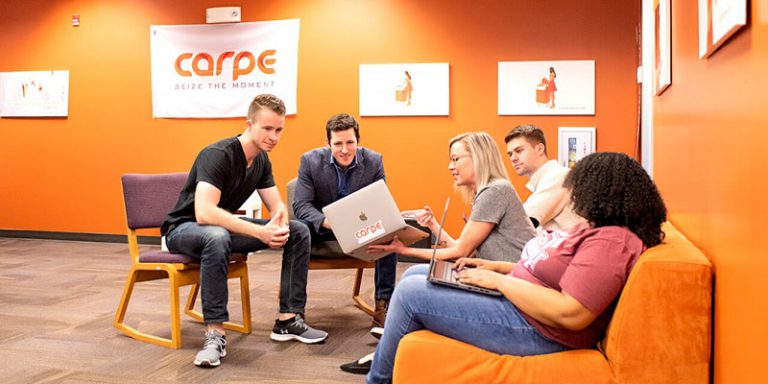Kenan Institute Distinguished Fellow Emmanuel Yimfor of the University of Michigan Ross School of Business tells leaders that when there are no win-win solutions among stakeholders, it’s important to explain the issues that are at the heart of stakeholder capitalism.
Yimfor, a Kenan Institute Distinguished Fellow, will discuss his recent work on how access to venture capital varies by the founder’s race and alma mater and explore mechanisms driving the variation.

Mahka Moeen: Helping Students and Startups Innovate
From research to teaching to community, UNC Kenan-Flagler Business School Associate Professor Mahka Moeen always has an eye on innovation and creative adaptation. Learn about her inspired – and inspiring – approach to her work in this recent article.
Each month Launch Chapel Hill and the UNC Entrepreneurship Center host fireside chats with a different theme. These chats showcase a broad range of entrepreneurs at various stages of their venture evolution. Featured entrepreneurs will discuss their journey: the good, the bad and the ugly. The first of the spring series will be on January 27 and will feature Eric Happel, who works on Nike's Global Partners Management and Strategy team. Join us as Eric describes his decision to leave Nike for a startup, his experience building a startup and then his return to Nike with his newfound knowledge and skills.
This event is a networking meetup for Black entrepreneurs in the UNC Entrepreneurship Center community. The event will start with Zoom breakout rooms for networking and authentic conversations followed by a moderated panel discussion with three Black entrepreneurs.
This lunchtime conversation will feature sales experts Lilly Ferrick and Chris Morrison, two entrepreneurs and Scale School instructors who have each helped hundreds of entrepreneurs re-define their sales processes and create sales systems that are repeatable and scalable.
In the Entrepreneurship Center's second chat, they feature the superstar-sister-founder-team: Niki and Ritika Shamdasani of Sani, a South Asian-inspired fashion brand. The sisters launched Sani in 2017 to create the outfits and shopping experience they always wished they could find for cultural clothing. That mission has led to a first-of-its-kind partnership with Rent the Runway, features in Business Insider, NBC and Good Morning America, and a loyal following of 70,000 on TikTok.

These conversations seek to showcase a broad range of entrepreneurs who are making an impact in their field, as well as introduce and connect these people to the Launch Chapel Hill and Triangle community. Our first chat highlights Duke-UNC superstar team, Kasper Kubica and David Spratte, co-founders of Carpe -- the first all-over body sweat management brand known for its category-leading hand and foot antiperspirants.
The Eship Center's second Luminary talk highlights Mary Grove who brings nearly two decades of leadership experience in technology, early-stage investing and startup ecosystem growth

Is There a Small Business Funding Gap?
Small businesses are an undeniable engine of growth for the United States, comprising 99 percent of all U.S. firms and driving nearly half our total economic activity. Yet small business owners across the country lack sufficient capital to succeed, grow and scale. The Kenan Institute has conducted a new analysis on the role of the Small Business Administration’s SBIC program in providing capital to the often-overlooked small businesses operating outside of metropolitan centers, as well as those owned by women and underrepresented minorities. Greg Brown, executive director at the Kenan Institute and professor of finance at UNC Kenan-Flagler Business School, discusses the findings in this video.

Please join the Kenan Institute for an exclusive conversation with Squad Founder and CEO Isa Watson on Thursday, Feb. 13. The event takes place in Kenan Center 204 and is part of the Dean’s Speaker Series, hosted by UNC Kenan-Flagler Business School's Senior Associate Dean for Academic Affairs Dave Hoffman.







Surge in New Business Formation Brings Migration of Opportunity
Kenan Institute Distinguished Fellow John Haltiwanger of the University of Maryland sees the growth in startups and remote work as especially benefiting the South and the areas around urban downtowns.